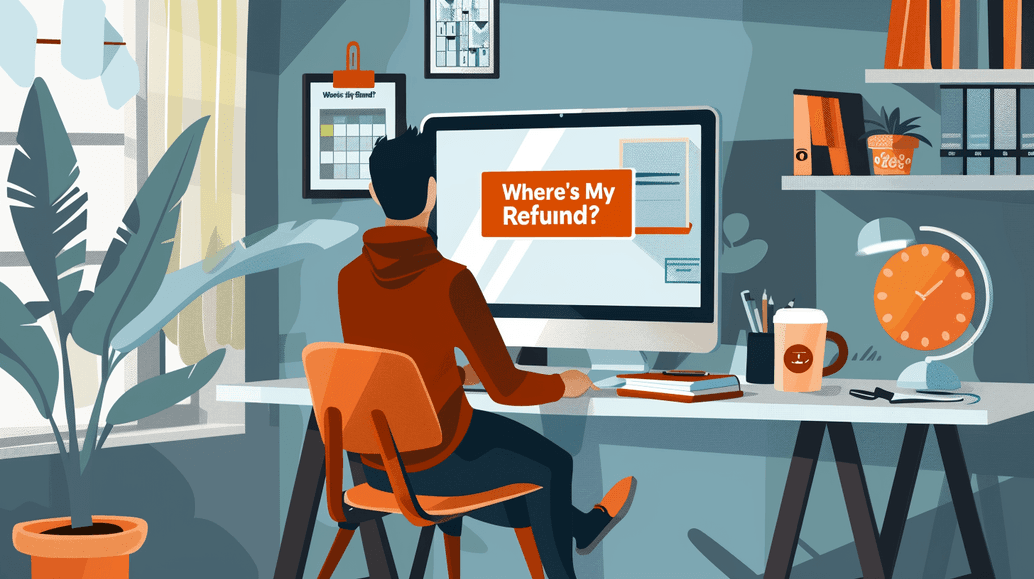Where's My Tax Refund, and How Soon Will I Get It?

By this time of the year, millions of Americans have already filed their tax returns and are receiving tax refunds. While the Internal Revenue Service (IRS) is still processing forms, according to their data, nearly $125 billion has been refunded since the start of the current tax season, which is over 8% more than the same period in 2024.
However, many taxpayers are concerned with a number of questions. How long are tax refunds taking this year? When do tax returns arrive? And, most crucially, do you know you qualify to receive one? Today, we’re going to discuss all of that and more.
Who Is Eligible for Tax Refunds?

Here are the most common circumstances that make you eligible for a tax refund:
- Overpaid Taxes: This scenario is quite common. If more taxes have been withheld from your paycheck than you owe by year’s end, you can reclaim the excess as a refund. This often occurs when taxpayers fail to adjust their work withholdings to reflect changes in income or marital status.
- Earned Income Tax Credit (EITC): Low- and moderate-income individuals who qualify for this credit can be issued a refund. The EITC is a refundable credit, which means you can get a repayment even if you don’t owe taxes. According to the IRS, four out of every five employees claim the EITC.
Child Tax Credit: Child tax credits, which are partially refundable, can lead to a refund if the credit surpasses your total taxes. To meet the requirements, your child must:
- Hold a US citizenship and be under 17 years old;
- Have a Social Security number;
- Be included as a dependent on the taxpayer’s return of taxes.
- Fosterlings or extended family members under your care can also make you eligible for a refund. If you have paid someone to care for your children, partner, or relatives, you can lower your taxes by claiming the Child and Dependent Care deduction.
- American Opportunity Tax Credit: Part of this education credit is refundable. If you qualify, you can receive up to $1,000 as a refund even if you don’t owe any taxes. The remaining credit is refundable up to 40% of the leftover amount or $1,000 if you reduce your tax liability to $0 before using all the $2,500 credit.
- Other Refundable Credits: There’s many more credits that make you eligible for a tax refund. These include the Premium Tax Credit for those who receive health insurance through the Health Insurance Marketplace and the Earned Income Tax Credit for those who fall below a certain income level.
- Self-Employment Income: Self-employed individuals who make quarterly estimated tax payments may overpay and thus be eligible for a refund. This happens when their actual tax liability turns out to be less than their estimated payments.
- Tax Deductions and Adjustments: If you qualify for deductions (such as student loan interest or IRA contributions) or income adjustments that reduce your taxable income below the amount of your tax payments, you may be eligible for a refund.
So, we hear you ask, when will I receive my tax refund? Sadly, the exact date depends on a number of unpredictable factors. However, if you want to always get your refunds as soon as possible, make sure to file your taxes on time. Filing late and opting for mail instead of e-filing are the most common reasons for refund delays.
Understanding the average tax refund helps set realistic expectations about what you may receive.
What Do You Do After Filing for a Refund?

When will I get my tax refund? There are three ways to find out.
The first is using the Where’s My Refund online tool by the IRS. Because its database is refreshed every day, you can instantly find out whether the IRS has approved your return.
To track your refund, you need to input the following:
- The year of taxation you wish to verify;
- A social security number or tax identification number;
- The precise sum of your refund as displayed on your tax return;
- Status of the taxpayer: head of a family, widow(er), married, or single.
For tech-savvy taxpayers, reading a Cash App taxes review may clarify how refund flows integrate with digital tools.
Once you’ve submitted this information, you’ll see if a return is accepted, submitted, or received.
The second option is utilizing the inquiry application form found on the IRS website. |Note that you’ll still need to provide all the information mentioned above.
Finally, you can just call the IRS at 800-829-1040 to find out how your refund is progressing.
How long do tax returns take? The sooner you file, the quicker you’ll see that refund. It may take up to three weeks for your return to be processed and your refund approved. If there are errors, you’ll get a letter from the IRS. Usually, the process takes 21 days, per the IRS.
One effective method to make a refund work harder is using a backdoor Roth IRA to maximize tax benefits.
What Can Impact Refund Schedules?

How long does it take to get a tax refund? When do you receive your tax return if you filed your taxes near the deadline? There are several factors influencing refund timings.
- Filing taxes by mail is way slower than e-filing. The data simply takes more time to travel by mail than via the Internet, resulting in a refund delay.
- The date of filing does matter. Your refund can be postponed if you have filed your return around the deadline. How long you’ll have to wait depends on the IRS processing capabilities this tax season.
- Your form contains errors. In this case, the IRS sends a letter to get the correct info, which naturally makes the process take more time.
- IRS suspects personal data theft or falsification. If the IRS detects some suspicious activities, your return may be postponed until the problem is resolved.
- A refund requires additional consideration. The IRS frequently takes longer than expected to analyze a return.
Claiming the EITC or ACTC may also delay your refund. By law, the IRS cannot issue refunds for these credits until mid-February.
I received my refund late, how can I avoid this situation in the future? First, remember to always fill out your taxes online. Offline data takes more time to process because IRS employees have to type it into the system and correct errors manually. It can result in your returns arriving several months late.
It’s worth noting how Venmo taxes handle new form filings when you receive or use your refund via peer-to-peer payments.
Conclusion
So, by the end of the day, how long does it take to receive a tax refund? As you can say by now, it’s simply impossible to predict accurately. There’s a lot of nuance to filing for tax returns, and any error can make the process considerably longer. Similarly, sticking to offline filing may result in several months of waiting time. And even if you do everything in your power to get your refunds as soon as possible, the incredible complexity of the US tax system makes delays sadly inevitable. Still, by following the simple steps outlined above, you can maximize your chances of getting a refund quickly.




